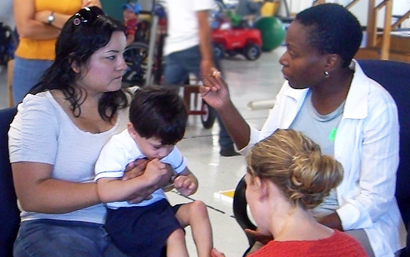Doctor Creates Training to Battle Bullying
/ Dr. Marie Green (right) has a background in family medicine. During a County internship, she developed an anti-bullying curriculum.
Dr. Marie Green (right) has a background in family medicine. During a County internship, she developed an anti-bullying curriculum.
Some children and adolescents may view their bullying as “just messing around.” But, to Dr. Marie Green, bullying is a serious issue that impacts individuals, schools, communities and families. And she wanted to do something about it.
How does a pediatrician with 2,000 patients in Northern California end up in San Diego working on bullying, a topic many consider a social issue?
Born in Haiti, Green left her home country in 1990 due to the political turmoil. She moved to Mexico City and later to New York to continue studying medicine. Along the way, she married her husband, who is in the Marine Corps. Together they have been stationed in several places across the U.S. while she continued her education by earning a master’s degree in Public Health.
In Stockton, she worked for a nonprofit organization where she served nearly 2,000 patients, but Green still wanted to work in public health. Green did some research and discovered a California State program that focuses on preventive medicine and places applicants in public health departments throughout the state. Dr. Wilma Wooten, the San Diego County Public Health Officer, was a perfect fit because she has practiced family and preventive medicine.
Hello San Diego County!
Green came here planning to join the fight against obesity, but soon found a different passion: putting an end to bullying. She said we can help stop bullying by learning to communicate better.
“Children who are being bullied need to talk to their parents,” said Green. “Bullying is not just a school issue. It’s a family issue. It’s a community issue.”
“I wanted to find out why some children get bullied but not others,” she added.
Bullying can cause serious and lasting harm that can affect a child’s physical and emotional well-being. There are multiple kinds of bullying: verbal (name-calling, teasing), social (rumor-spreading, social exclusion) and physical (hitting, punching, and shoving.) There is also cyber bullying, where youths use the internet, mobile phone or other technology to do harm.
Bullying typically involves an imbalance of power. The perpetrators use their power to control or harm others and the victims usually don’t have the power to defend themselves.
“Kids teasing each other…can lead to them being vulnerable as adults, creating a cycle of violence and vulnerability,” said Green.
During her 12 months here, Green created a curriculum about bullying that has now been used to educate foster parents and will be used to train County social workers. Her state-paid internship ends in October.
“I would like it to go further,” she said, adding that while she is happy the attitude towards bullying is changing, it won’t disappear completely until people show more empathy towards one another.
“Things that should makes us cry, we laugh about,” said Green. “We need to teach kids to have more empathy for others. If we see something that is wrong, we need to say and do something.”
She would like to stay in this area after her internship is over.
“I love San Diego,” she said. “My husband is currently deployed in Afghanistan…and if I find an opportunity, I’ll stay here.”